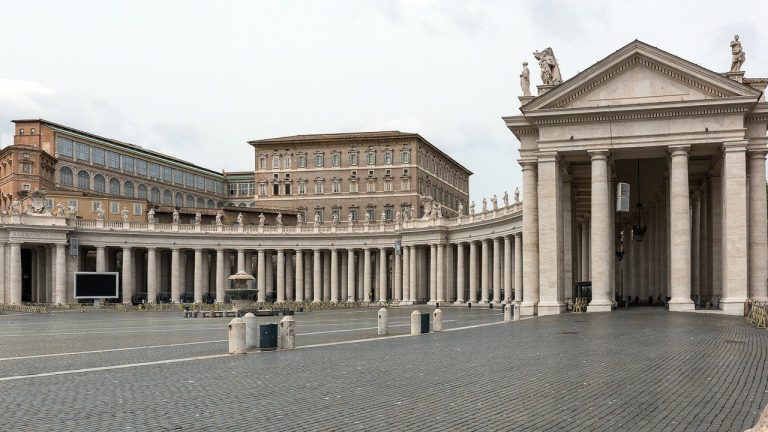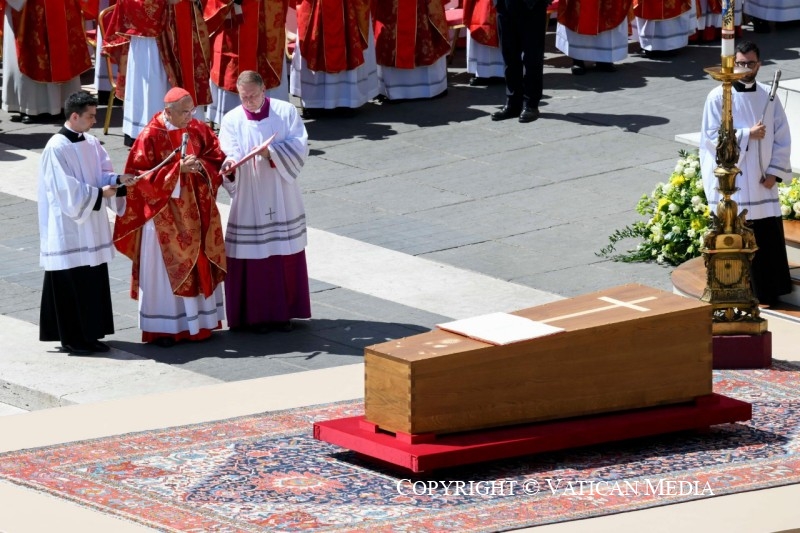‘Motu Proprio’: Anti-Corruption Law for Executives
Pope's Action Promotes Transparency in the Management of Finances

Pope Francis has established a new Anti-Corruption Law for Vatican executives, through an Apostolic Letter in the form of a Motu Proprio, which establishes measures on transparency in the management of public finances.
In it, the Holy Father exacts from all employees in executive levels of the Holy See, and all those engaged in active administrative, jurisdictional or controlling functions, to sign a statement in which they assure that they haven’t received final convictions, that they are not subject to pending criminal processes or investigation for corruption, fraud, terrorism, money laundering, exploitation of minors or tax evasion.
It is a measure that follows that stipulated in May of 2020, when Pope Francis promulgated essential measures to combat corruption in the realm of public contracts through the “Norm on Transparency, Control, and Competence in Public Contracts of the Holy See and of Vatican City State.”
“However, corruption can manifest itself in different ways and forms, including in different sectors to that of contracts, and that is why the norms and best practices at the international level provide for particular transparency obligations for individuals occupying key posts in the public sector, in order to prevent, combat in all sectors conflicts of interest, clientelism practices and corruption in general,” says the Pontiff in the new Motu Proprio.
Given its adherence to the United Nations Convention Against Corruption (Merida Convention), the Holy See “has decided to adapt itself the best practices to prevent and combat corruption in its different forms,” he continues.
Thus, as “Vatican News” describes in a special article published today, the Holy Father has decided to “add articles to the General Regulation of the Roman Curia, with a measure that concerns all who are in functional levels C, C1, C2 and C3 (that is, from the Cardinals Heads of Dicasteries to the Vice-Directors with five-year management contracts.), and to all those that have functions of active jurisdictional administration or of control and supervision.” All “will have to sign a statement at the time they are contracted and then every two years.”
They are also asked to “testify that they have not had final convictions either in the Vatican or in other States, and of not having benefitted from an indult, amnesty or grace, and of not being absolved by prescription.” Moreover, they must not be “subject to pending criminal procedures or investigations for taking part in a criminal organization, corruption, fraud, terrorism, money laundering from criminal activities, exploitation of minors, human trafficking or exploitation and tax evasion or avoidance.”
In addition, according to “Vatican News,” they “must declare that they do not have, not even through third parties, cash or investments or participation in companies or businesses in countries included in the list of jurisdictions with high risk of money laundering (unless their family members are residents or are domiciled for demonstrated family, work or study reasons),” as well as “guarantee, in so far as they know, that all the movable and immovable goods of their property or that they only have in their possession, as well as remunerations of any sort that they receive come from licit activities.” Significant, moreover, is that they must not have “participation or interests in companies or businesses that operate with ends contrary to the Social Doctrine of the Church.
The Secretariat for the Economy will be able to carry out proofs of the “veracity of the declarations made on paper by the declarants, and in case of false or mendacious statements, the Holy See will be able to fire the employee and claim the damages and harm suffered.”
Finally, all employees of the Roman Curia, of Vatican City State and of related organizations are prohibited from “accepting, for reasons of their position, gifts or other benefits of a value higher than 40 euros.
Here is the full text of Pope Francis’ Apostolic Letter in the form of a Motu Proprio, which establishes measures on transparency in the management of public finances.
APOSTOLIC LETTER
ISSUED “MOTU PROPRIO”
OF THE SUPREME PONTIFF
FRANCIS
ON ON PROVISIONS ON TRANSPARENCY IN THE MANAGEMENT OF PUBLIC FINANCES
Faithfulness in matters of little account is related, according to Scripture, to faithfulness in things of importance, just as being dishonest in things of little importance is related to being dishonest in things of importance (cf. Lk 16:10).
The Holy See, in adhering to the United Nations Convention against Corruption (Merida Convention), has decided to conform to best practices for preventing and combating corruption in its various forms. Already with the Apostolic Letter issued Motu Proprio of 19 May 2020, entitled “Norms on Transparency, Control and Competition in Public Contracts of the Holy See and Vatican City State”, fundamental safeguards were put in place to combat corruption in the area of public contracts. However, corruption can also occur in different ways and forms in sectors other than procurement, and this is why international regulations and best practices provide for special obligations of transparency for persons holding key positions in the public sector in order to prevent and combat, in every sector, conflicts of interest, patronage and corruption in general.
Considering that all those who work in the Dicasteries of the Roman Curia, in the institutions linked to the Holy See, or which refer to it, and in the administrations of the Governorate of Vatican City State have a particular responsibility to put into practice the fidelity spoken of in the Gospel, by acting according to the principle of transparency and in the absence of any conflict of interest, I establish the following:
- 1In the General Regulations of the Roman Curia, after Article 13, the following article is inserted «Article 13bis.
- 1Persons employed or to be employed at functional levels C, C1, C2 and C3, including Cardinal Heads of Dicasteries or Heads of Institutions, as well as those with active jurisdictional administrative or control and supervisory functions as indicated in §2, including the persons referred to in articles 10, 11 and 13§1 of the present Regulations and 20 of the Regulations for lay management personnel of the Holy See and Vatican City State, must sign a declaration at the time of taking office or appointment and every two years, in which they certify that
- a) that they have not been convicted of any criminal offence in the Vatican City State or abroad and that they have not benefited from any pardon, amnesty, pardon or other similar measure in relation to the same, or have been acquitted by prescription;
- b) that he/she is not the subject of pending criminal proceedings or, as far as is known to the declarant, of investigations for offences of participation in a criminal organisation; corruption; fraud; terrorism or terrorism-related activities; laundering of proceeds of criminal activities; exploitation of minors, forms of trafficking in or exploitation of human beings, tax evasion or avoidance.
- c) that he/she does not hold, even through a third party, cash or investments, including shares or interests of any kind in companies and businesses, in countries included in the list of jurisdictions with a high risk of money laundering or terrorist financing as identified by order of the Financial Intelligence and Surveillance Authority, unless the declarant or his/her relatives up to the third degree of kinship are resident in such countries or have established their domicile there for proven family, work or study reasons;
- d) that all movable and immovable property owned or held by the declarant, or compensation of any kind received by the declarant, to the best of the declarant’s knowledge, originates from lawful activities and does not constitute the proceeds or profit of crime;
- e) not to hold, to the best of the declarant’s knowledge, shareholdings or interests of any kind in companies or firms operating for purposes and in sectors contrary to the Social Doctrine of the Church;
- f) not to hold, even through a third party, cash or investments, including shares or interests of any kind in companies and businesses, in countries included in the list of non-cooperative jurisdictions for tax purposes identified by order of the Secretariat for the Economy, unless the declarant or his/her relatives up to the third degree of kinship are resident in such countries or have established their domicile there for family, work or study reasons, and such assets have been declared to the competent tax authorities.
- 2 Active administrative functions shall mean those involving participation in the procedures leading to the making of financial commitments of any kind by the institution. The judicial functions referred to in paragraph 1 are only those of a judicial nature. Paragraph 1 shall not apply to the support staff of control and supervisory bodies. By order of the Office of the Auditor General as anti-corruption authority, the offices and positions to which the declaration obligations under this paragraph apply are identified.
- 3 The declaration referred to in paragraph 1 shall be kept by the Secretariat for the Economy in the personal file of the declarant. A copy shall be forwarded to the Secretariat of State as far as it is competent.
- 4 Where it has reasonable grounds, the Secretariat for the Economy may carry out checks on the veracity of the declarations submitted, making use of the competent bodies of the Holy See or of the Vatican City State.
- 5 Without prejudice to cases of criminal liability, failure to make a declaration or making a declaration that is false or untrue constitutes a serious disciplinary offence within the meaning of Article 76, §1, no. 2) and entitles the Holy See to claim for any damage suffered”.
- 2In Article 40, paragraph 1, of the General Regulations of the Roman Curia, the following letter is inserted after letter m): “n) accepting or soliciting, for themselves or for persons other than the Institution in which they work, by reason or on the occasion of their office, gifts, presents or other benefits of a value greater than forty euros”.
- 3The Governorate of Vatican City State, the Courts of Vatican City State and the Entities included in the list referred to in Article 1§1 of the Statute of the Council for the Economy to whom the General Regulations of the Roman Curia are not applicable must amend their personnel regulations in accordance with the provisions of paragraphs 1 and 2 within ninety days of the entry into force of this Motu Proprio.
I decree that what has been established shall have immediate, full and stable effect, notwithstanding any incompatible provisions, and that this Apostolic Letter in the form of a Motu Proprio be published in “L’Osservatore Romano” of 29 April 2021 and subsequently in the Acta Apostolicae Sedis.
Given in Rome, at Saint Peter’s, on 26 April 2021, the ninth year of my Pontificate.
FRANCISCUS
© Copyright – Libreria Editrice Vaticana
Related

Cardinal Parolin at the Novendalia Mass: “Mercy leads us to the heart of faith”
Exaudi Staff
27 April, 2025
8 min

Pope Francis’ Tomb in Santa Maria Maggiore
Exaudi Staff
27 April, 2025
1 min

Mercy and the joy of the Gospel are two key concepts of Pope Francis
Exaudi Staff
26 April, 2025
9 min

Thousands of faithful bid farewell to Pope Francis in St. Peter’s Square
Exaudi Staff
26 April, 2025
2 min
 (EN)
(EN)
 (ES)
(ES)
 (IT)
(IT)

